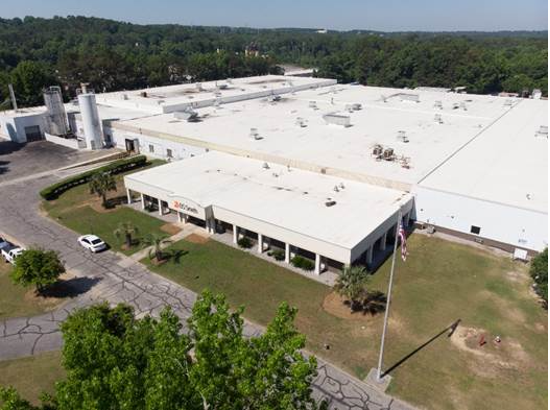Columbia corrugated facility sees 700+ ton CO2 reduction while increasing speed and capacity
COLUMBIA, S.C., Dec. 18, 2023 – DS Smith, a leading provider of sustainable, fiber-based packaging worldwide, recently completed the installation of new steam recycling technology that will reduce energy consumption by 20% in its Columbia, S.C. corrugated packaging facility. This investment is part of DS Smith’s ambitious sustainability commitments to its North American customers.
The new multi-million-dollar Baviera Steam Systems technology installed at the specialty coated box manufacturing plant efficiently recovers condensate typically lost in the corrugation process. Energy savings created through condensate recovery reduces DS Smith’s carbon footprint in Columbia, and the new technology also increases productivity by reducing maintenance downtime at the plant.
“Our South Carolina facility makes water-resistant, fully recyclable Greencoat® boxes for fresh poultry and produce providers – agribusinesses that recognize decarbonization as a key factor to their continued success,” said Steven Rose, Managing Director, Packaging, for DS Smith North America Packaging and Paper (NAPP). “With this investment, we are decreasing the amount of natural gas consumed at the facility by 20%, substantially reducing CO2 emissions while also enabling faster throughput.”
Reducing natural gas usage at the DS Smith NAPP Columbia box plant will yield an estimated 740-ton decrease in annual CO2 emissions. Decarbonization at this scale is one of several initiatives in North America and Europe driven by DS Smith’s Now and Next sustainability strategy, which aims to reduce emissions by 46% in absolute terms by 2030, compared with 2019 levels, and achieve net zero emissions by 2050. The company, which is a member of the United Nations-led Race to Zero campaign1, also participates in the Science Based Targets initiative (SBTi)2 and has set a 1.5°C target in line with the goals of the Paris Agreement.
Greater manufacturing flexibility and productivity
The new installation at the Columbia box plant includes Baviera Steam Systems’ Condensate Recovery Unit along with Digital Steam Pumps from Baviera capable of managing the pressure required for corrugation using lightweight and heavyweight papers. Continuous heat transfer control solutions installed with the steam system help to ensure greater consistency, improving control room management and eliminating the need for operator tweaks that can impact long-term performance.
The new technologies also reduce downtime needed to adjust steam pressure when changing paper weights or fluting settings, boosting overall volume capacity at the plant by up to 5%. Faster, simplified changes between board grades with the upgrade will also reduce manufacturing waste.
Driving circularity with coated boxes
The Columbia box plant produces corrugated shipping containers made from DS Smith’s propriety Greencoat material: a 100% recyclable coated and food contact safe alternative to non-recyclable wax-coated boxes. Industrial businesses in the fresh poultry, produce and seafood industries rely on this sustainable wax alternative product for safe and leak-proof shipping of their products across the U.S. and worldwide. Greencoat boxes cost less than wax-coated boxes, and users do not have to pay fees charged for wax-coated box disposal. Instead, industrial food processors can sell their used Greencoat boxes to recycling facilities.
DS Smith NAPP’s Columbia plant also uses Greencoat to produce GreenTote™ boxes, a 100% recyclable alternative to plastic grocery bags used in supermarkets, and GreenChute™, a 100% recyclable yard waste bag filler. Greencoat products are examples of how DS Smith is continuing to deliver on its purpose of Redefining Packaging for a Changing World, supporting the transition to a circular economy and eliminating waste and pollution by design. By creating 100% recyclable or reusable packaging and helping its customers design out hard to recycle plastics, the company drives greater circularity by keeping materials in use for longer.
DS Smith has already helped its customers replace 762 million problem plastics with fiber-based alternatives since 2020, with a goal to reach 1 billion plastics replaced by 2025. Through its unique design process, the business has also created more than 30,000 circular-ready projects through its industry-leading Circular Design Metrics, a design analysis tool that helps customers drive sustainability performance.
About DS Smith
DS Smith is a leading provider of sustainable fiber-based packaging worldwide, which is supported by recycling and papermaking operations. It plays a central role in the value chain across sectors including e-commerce, fast moving consumer goods and industrials. Through its purpose of “Redefining Packaging for a Changing World” and its Now and Next sustainability strategy, DS Smith is committed to leading the transition to the circular economy, while delivering more circular solutions for its customers and wider society – replacing problem plastics, taking carbon out of supply chains and providing innovative recycling solutions. Its bespoke box-to-box in 14 days model, design capabilities and innovation strategy sit at the heart of this response.
Headquartered in London and a member of the FTSE 100, DS Smith operates in 34 countries employing around 30,000 people and is a Strategic Partner of the Ellen MacArthur Foundation. Its history can be traced back to the box-making businesses started in the 1940s by the Smith family. North American operations are based in Atlanta, with 15 manufacturing, paper and recycling facilities, totaling more than 2,000 employees.
1 Led by the UN Climate Change High-Level Champions and the Marrakech Partnership, the Race to Zero is a global campaign works with non-state actors – including companies, cities, regions, financial, educational, and health care institutions – to take rigorous and immediate action to halve global emissions by 2030 and deliver a healthier, fairer, net zero world.
2 The SBTi (sciencebasedtargets.org) – a partnership between the Carbon Disclosure Project, the United Nations Global Compact, World Resources Institute, and the World Wide Fund for Nature – guides companies in science-based target setting for the transition to a net zero economy.
SOURCE DS Smith
Enhanced Document Security: Safeguarding Your Printing Process at Every Step



